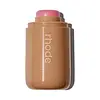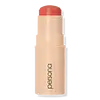What's inside
What's inside
 Key Ingredients
Key Ingredients

 Benefits
Benefits

 Concerns
Concerns

No concerns
 Ingredients Side-by-side
Ingredients Side-by-side

Octyldodecanol
EmollientSynthetic Wax
AbrasiveHydrogenated Polyisobutene
EmollientCetyl Ethylhexanoate
EmollientPolyglyceryl-2 Triisostearate
EmulsifyingHydrogenated Poly(C6-14 Olefin)
EmollientBis-Diglyceryl Polyacyladipate-2
EmollientKaolin
AbrasiveSilica
AbrasiveMagnesium/Potassium/Silicon/Fluoride/Hydroxide/Oxide
Glycerin
HumectantCalophyllum Inophyllum Seed Oil
AntimicrobialPalmitoyl Tripeptide-1
Skin ConditioningPalmitoyl Tripeptide-5
Skin ConditioningCaprylyl Glycol
EmollientCaprylic/Capric Triglyceride
MaskingGlyceryl Caprylate
EmollientPentaerythrityl Tetraisostearate
EmollientAluminum Hydroxide
EmollientTriethoxycaprylylsilane
Water
Skin ConditioningPropylene Carbonate
SolventLauryl Polyglyceryl-3 Polydimethylsiloxyethyl Dimethicone
Skin ConditioningStearalkonium Hectorite
Gel FormingEthylhexylglycerin
Skin ConditioningCI 77891
Cosmetic ColorantIron Oxides
CI 45410
Cosmetic ColorantCI 42090
Cosmetic ColorantOctyldodecanol, Synthetic Wax, Hydrogenated Polyisobutene, Cetyl Ethylhexanoate, Polyglyceryl-2 Triisostearate, Hydrogenated Poly(C6-14 Olefin), Bis-Diglyceryl Polyacyladipate-2, Kaolin, Silica, Magnesium/Potassium/Silicon/Fluoride/Hydroxide/Oxide, Glycerin, Calophyllum Inophyllum Seed Oil, Palmitoyl Tripeptide-1, Palmitoyl Tripeptide-5, Caprylyl Glycol, Caprylic/Capric Triglyceride, Glyceryl Caprylate, Pentaerythrityl Tetraisostearate, Aluminum Hydroxide, Triethoxycaprylylsilane, Water, Propylene Carbonate, Lauryl Polyglyceryl-3 Polydimethylsiloxyethyl Dimethicone, Stearalkonium Hectorite, Ethylhexylglycerin, CI 77891, Iron Oxides, CI 45410, CI 42090
Octyldodecanol
EmollientPolyethylene
AbrasiveHydrogenated Polyisobutene
EmollientKaolin
AbrasiveNylon-12
Paraffin
PerfumingTrihydroxystearin
Skin ConditioningPhenoxyethanol
PreservativeCarthamus Tinctorius Seed Oil
MaskingCamellia Sinensis Leaf Extract
AntimicrobialCamellia Oleifera Leaf Extract
AstringentTocopheryl Acetate
AntioxidantEthylhexylglycerin
Skin ConditioningCI 77891
Cosmetic ColorantIron Oxides
Acid Red 27 Aluminum Lake
Acid Yellow 3 Aluminum Lake
Acid Blue 9 Aluminum Lake
Octyldodecanol, Polyethylene, Hydrogenated Polyisobutene, Kaolin, Nylon-12, Paraffin, Trihydroxystearin, Phenoxyethanol, Carthamus Tinctorius Seed Oil, Camellia Sinensis Leaf Extract, Camellia Oleifera Leaf Extract, Tocopheryl Acetate, Ethylhexylglycerin, CI 77891, Iron Oxides, Acid Red 27 Aluminum Lake, Acid Yellow 3 Aluminum Lake, Acid Blue 9 Aluminum Lake
 Reviews
Reviews

Ingredients Explained
These ingredients are found in both products.
Ingredients higher up in an ingredient list are typically present in a larger amount.
Ci 77891 is a white pigment from Titanium dioxide. It is naturally found in minerals such as rutile and ilmenite.
It's main function is to add a white color to cosmetics. It can also be mixed with other colors to create different shades.
Ci 77891 is commonly found in sunscreens due to its ability to block UV rays.
Learn more about CI 77891Ethylhexylglycerin (we can't pronounce this either) is commonly used as a preservative and skin softener. It is derived from glyceryl.
You might see Ethylhexylglycerin often paired with other preservatives such as phenoxyethanol. Ethylhexylglycerin has been found to increase the effectiveness of these other preservatives.
Hydrogenated Polyisobutene is a synthetic polymer. Polymers are compounds with high molecular weight. Hydrogenated Polyisobutene is an emollient and texture enhancer.
In one study, Hydrogenated Polyisobutene showed better skin hydration levels than Caprylic/Capric Triglyceride. As an emollient, it helps keep your skin soft and hydrated by trapping moisture in.
Hydrogenated Polyisobutene is often used as a mineral oil replacement.
Learn more about Hydrogenated PolyisobuteneKaolin is a clay. It is used for oil control and to help minimize pores. Like other clays, kaolin has the ability to absorb excess sebum or oil. This can help clean out pores and mattify the skin.
Some types of kaolin may have exfoliating properties. When water is added to kaolin, it becomes a paste with small abrasive particles.
Most kaolin is a white color, but may be pink/orange/red depending on where it comes from.
The name 'kaolin' comes from a Chinese village named 'Gaoling'. Kaolin clay comes from rocks rich in kaolinite. Kaolinite, the mineral, has a silicate layered structure. Kaolinite is formed from chemical weathering of aluminum siilicate minerals.
Besides skincare, kaolin is commonly used to make glossy paper, in ceramics, toothpaste, and as medicine to soothe stomach issues.
Learn more about KaolinOctyldodecanol is a fatty alcohol. It is primarily used to enhance the texture of products.
As an emulsifier, Octyldodecanol helps prevent the oils and waters from separating. It also prevents ingredients from creating foam when shaken.
Octyldodecanol is created by reducing fatty acid to an alcohol.
Due to its high molecular weight, it does not get absorbed into the skin.
Learn more about OctyldodecanolThis ingredient is a combination of red, black, and yellow iron oxide pigments. This combination of colors is usually found in foundation, because it results in a "skin" color.